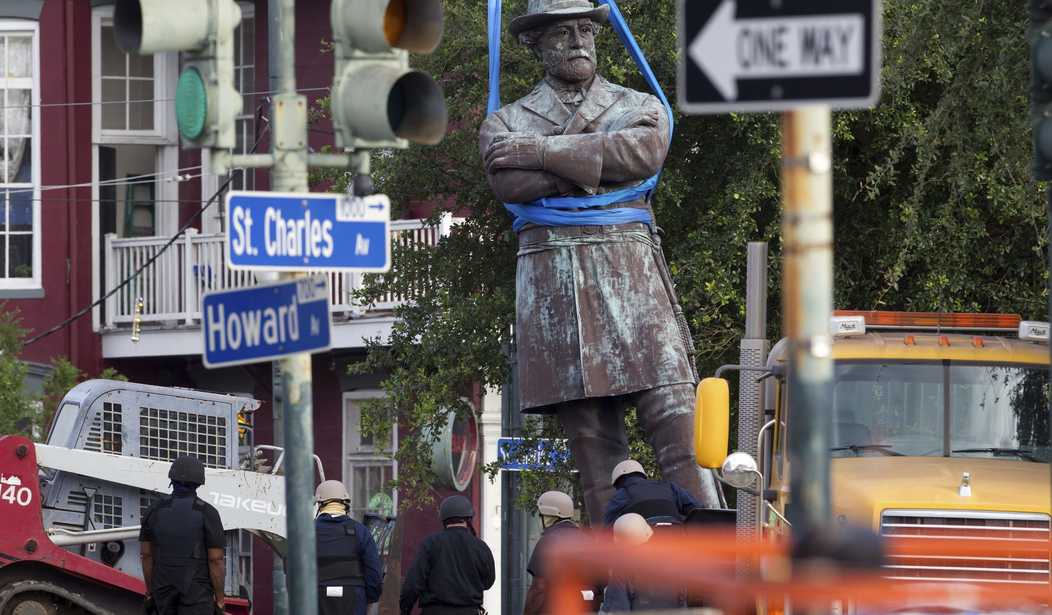As work crews tore down Civil War monuments in New Orleans, state Rep. Thomas Carmody (R) launched what he said was a final effort to save the statues of heroes of the Confederacy in Louisiana.
The last of the monuments to the Confederacy in New Orleans, a statute of Gen. Robert E. Lee, was pulled down May 19.
The state House debate was so contentious May 15 that the Legislative Black Caucus stormed off the floor, and one political columnist warned that the Louisiana Democratic Party could be ripped apart by Carmody’s bid to save the memories of the Old South.
Rep. Josh Bouie (D), chairman of the Legislative Black Caucus, told reporters the HB 71 vote showed “a deep-rooted belief in white supremacy.”
HB 71 was approved by the House and is now at the committee stage in the Senate. It would force a public vote on tearing down any statute involving U.S. military veterans, a category that Carmody believes should include Confederate soldiers.
“This would be literally putting it in the will of the people,” Carmody said.
Carmody admitted that even in a best-case scenario House Bill 71 couldn’t be approved quickly enough to save Civil War monuments from wrecking balls.
But Carmody told KEEL Radio this is a battle worth waging because he believes it is wrong for municipal officials, as in New Orleans, to decide which statutes should stand and which should fall.
“Never in my lifetime have you seen landmarks in a community taken down at the whim of an administration,” Carmody said. “My concern is it seems like a regime change and with the whim of a few votes can change the public environment and the history that our story is told in.”
The Monumental Task Committee, a group devoted to saving Confederate statutes in the South, made a similar point when demolition crews tore down the Robert E. Lee monument.
“Mayor (Mitch) Landrieu and the City Council have stripped New Orleans of nationally recognized historic landmarks,” read a statement released by the Monumental Task Committee. “Robert E. Lee stood atop New Orleans for 133 years as one of the most well-respected men and military minds of American history until a politician with self-serving motives launched a toxic crusade to rewrite the city’s history.”
However, Landrieu (D) told reporters Confederate monuments had run more people out of New Orleans than a 70-percent increase in the city’s murder rate or even Hurricane Katrina. He said the statues and monuments built to honor the men of the Confederacy “have run people out of the city.”
“The great migration that sent some of our best and brightest to places across the country that we don’t have the benefit of has been incredible,” Landrieu said.
During the May 15 House debate that led to approval of HB 71, Rep. Katrina Jackson (D) said a referendum vote regarding the fate of Confederate statues would be even messier and more divisive than the argument that had raged in the lower house of the legislature.
Jackson also disagreed with Carmody’s description of the statues as being symbols to honor military veterans of the Confederacy.
“They’re pro-slavery monuments,” Jackson said. “Why would anyone in this body who considers themselves Christian protect monuments to people who promoted slavery?”
Not every Democrat agreed with Jackson. Political columnist Mark Ballard pointed out in the Advocate that 13 Democrats either voted for HB 71 or were absent during the House vote.
“For white Democrats, the Confederate monuments bill is poison,” Ballard wrote. “The intraparty bickering could cripple Gov. John Bel Edwards’ efforts to raise revenues, strip back tax breaks for businesses and other legislative initiatives, they predict. He needs every Democrat on the same page.”
Gov. Edwards said in April that the debate over Confederate statues and monuments in New Orleans was just that – an issue for New Orleans, but not for Louisiana.
“It’s not been something that we have been focused on at the state level,” the Times-Picayune reported Edwards said on his monthly radio show.
Edwards also said he had not yet spoken to Rep. Carmody and would wait to see “what view the Legislature takes toward the bills.”
Now that the House has approved the legislation and the Legislative Black Caucus has reacted with outrage to the bill, the Associated Press reported Edwards called HB 71 “problematic.”
“It’s very sad, having served in that body for eight years but I haven’t seen anything like that,” Edwards said. “We need to come together as a people, that was not the way to do it.”
Responding to a reporter’s question, Edwards declined to say, if it is approved by the Senate, whether he would veto the legislation.
“This is a very difficult issue for a lot of people,” Edwards said. “I understand that the passion runs high and while it is certainly part of our history, can we say it’s the best part?”









Join the conversation as a VIP Member